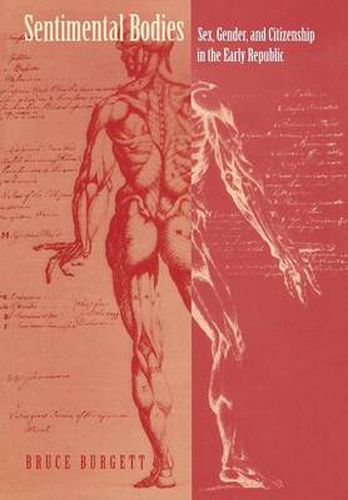Readings Newsletter
Become a Readings Member to make your shopping experience even easier.
Sign in or sign up for free!
You’re not far away from qualifying for FREE standard shipping within Australia
You’ve qualified for FREE standard shipping within Australia
The cart is loading…






Sentimentalism, sex, the construction of the modern body, and the origins of American liberalism all come under scrutiny in this rich discussion of political life in the early republic. Here Bruce Burgett enters into debates over the public sphere, a concept introduced by Jurgen Habermas that has led theorists to grapple with such polarities as public and private, polity and personality, citizenship and subjection. With the literary public sphere as his primary focus, Burgett sets out to challenge the Enlightenment opposition of reason and sentiment as the fundamental grid for understanding American political culture.Drawing on texts ranging from George Washington’s Farewell Address and Charles Brockden Brown’s Clara Howard to Hannah Foster’s The Coquette and Harriet Jacobs’s Incidents in the Life of a Slave Girl , Burgett shows that the sentimental literary culture of the period relied on readers’ affective, passionate, and embodied responses to fictive characters and situations in order to produce political effects.As such, sentimentalism located readers’ bodies both as prepolitical sources of personal authenticity and as public sites of political contestation. Going beyond an account of the public sphere as a realm to which only some have full access, Burgett reveals that the formation of the body and sexual subjectivity is crucial to the very construction of that sphere. By exploring and destabilizing the longstanding distinction between public and private life, this book raises questions central to any democratic political culture.
$9.00 standard shipping within Australia
FREE standard shipping within Australia for orders over $100.00
Express & International shipping calculated at checkout
Sentimentalism, sex, the construction of the modern body, and the origins of American liberalism all come under scrutiny in this rich discussion of political life in the early republic. Here Bruce Burgett enters into debates over the public sphere, a concept introduced by Jurgen Habermas that has led theorists to grapple with such polarities as public and private, polity and personality, citizenship and subjection. With the literary public sphere as his primary focus, Burgett sets out to challenge the Enlightenment opposition of reason and sentiment as the fundamental grid for understanding American political culture.Drawing on texts ranging from George Washington’s Farewell Address and Charles Brockden Brown’s Clara Howard to Hannah Foster’s The Coquette and Harriet Jacobs’s Incidents in the Life of a Slave Girl , Burgett shows that the sentimental literary culture of the period relied on readers’ affective, passionate, and embodied responses to fictive characters and situations in order to produce political effects.As such, sentimentalism located readers’ bodies both as prepolitical sources of personal authenticity and as public sites of political contestation. Going beyond an account of the public sphere as a realm to which only some have full access, Burgett reveals that the formation of the body and sexual subjectivity is crucial to the very construction of that sphere. By exploring and destabilizing the longstanding distinction between public and private life, this book raises questions central to any democratic political culture.